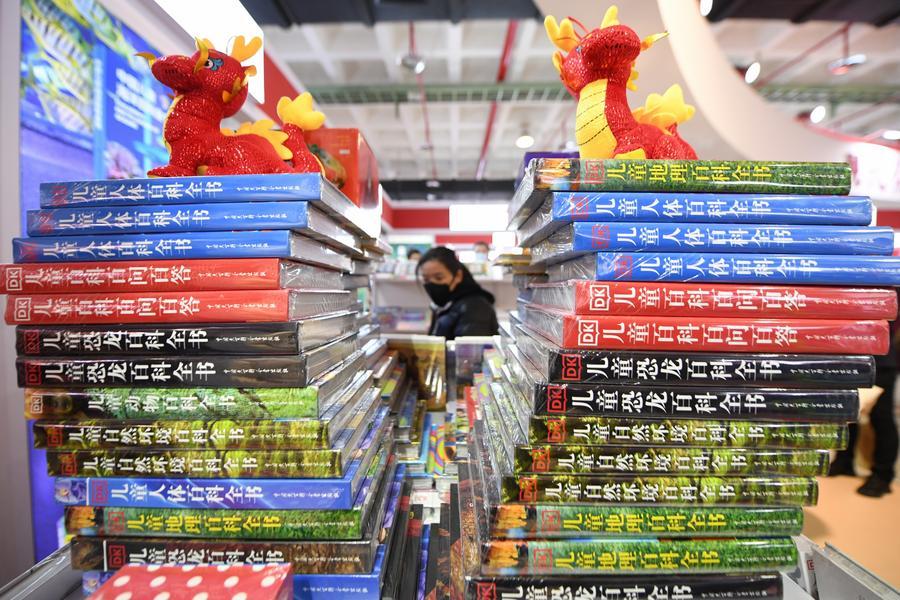
 0 Comment(s)
0 Comment(s) Print
Print E-mail Xinhua, April 22, 2024
E-mail Xinhua, April 22, 2024

A woman visits the 2024 Beijing Book Fair in Beijing, capital of China, Jan. 11, 2024. (Xinhua/Ju Huanzong)
On Douyin, China's most popular video-sharing platform, a program dedicated to exploring essential science books has gained millions of views and attracted nearly 90,000 loyal viewers in just two years. Every week, esteemed scientists and scholars are invited to appear on the program to share their insights on science books ranging from Euclid's "Elements" to Darwin's "On the Origin of Species" and Hawking's "A Brief History of Time."
Program planner Wu Guosheng said that his only goals were to ignite public interest in science and foster the participation of both scientists and the public.
"We do not encourage people to engage with classic science books for academic purposes, but rather to make the experience of reading about science captivating, enlightening and rewarding," said Wu, who is also dean of the Department of the History of Science at Tsinghua University. He and his team have promoted nearly 100 classic science books on social media since 2022.
In the past, the Chinese people had a preference for literary classics rather than scientific literature, and science books always received lukewarm responses. However, China today values sci-tech innovation, and there is growing enthusiasm for scientific literature.
According to data released by Beijing-based industry research company OpenBook, the science book market share has increased consistently since 2019. Despite an overall decline in book sales during the COVID-19 pandemic, there was a significant surge in the popularity of books about medicine and health.
A similar trend is also evident in the popularity of children's books, which account for the largest portion of the domestic book market. Since 2021, sales of science books for young readers have surpassed those of children's literature.

A child reads a book at a book store in Nanjing, east China's Jiangsu Province, July 8, 2023. Students around the country enjoy a variety of activities during the summer vacation. (Photo by Su Yang/Xinhua)
The upward trend is partly attributable to the fact that increasing numbers of experts are willing to share their knowledge through books, said Wang Dapeng, a member of the China Research Institute of Science Popularization.
Tan Xianjie, a 54-year-old gynecologist, is one such contributor. He has authored a series of books and created short videos to present medical information related to women's health.
The doctor once received a thank-you flag from a woman at his hospital who was not his patient. After watching Tan's lecture on cervical cancer, she booked an examination and underwent timely surgery after being diagnosed with early-stage cancer.
The experience reminded Tan of the significance of science popularization, which he said is "both a professional duty and a social responsibility for doctors."
When he began engaging in science popularization, it was not a common practice for Chinese doctors. Hospital evaluation systems did not consider science popularization to be as important as surgery quality and patient numbers, so it could not contribute significantly to a doctor's professional reputation.
In 2016, a significant shift saw national leaders recognize the importance of science popularization, describing scientific innovation and popularization as "the wings for the realization of innovation-driven development." Subsequently, government plans were implemented to underscore the necessity of strengthening the creation of popular science works.

A Mars probe is launched on a Long March-5 rocket from the Wenchang Spacecraft Launch Site in south China's Hainan Province, July 23, 2020. (Xinhua/Guo Cheng)
The popularity of science literature is also being boosted by China's rapid sci-tech development. Recent advancements in biomedicine, aerospace, astronomy, artificial intelligence and information technology have sparked waves of public enthusiasm for science and injected new vitality into the publication and marketing of science books, said Xu Guoqiang, deputy editor-in-chief of the World Publishing Company.
This year, Xu's company is releasing a series of popular astronomy books that will cover fascinating topics such as the moon and Mars.
"The public needs books to have a better understanding of the country's cutting-edge scientific achievements," said Xu, citing examples such as China's successful launch of a Mars rover and its future plans for manned moon landing missions.
Xu said that the development of popular science, related publications and reading relies on the people's scientific literacy. The latest data shows that 14.1 of percent of Chinese citizens were scientifically literate in 2023, and China aims to raise that to 25 percent by 2035.
"Science popularization is a crucial means to enhance the people's scientific literacy, and, in turn, an enhancement would also contribute to the prosperity of popular science," Xu noted.
Imported science books have long been highly competitive in the domestic market, with a typical example being Stephen Hawking's "A Brief History of Time," which has never left China's top 10 list of popular science books since it was introduced to the Chinese mainland in 1992.
Famous, original Chinese popular science works include the 1960s children's book "One Hundred Thousand Whys," the biographical "Goldbach Conjecture," and the late-1970s science fiction work "Little Smarty Travels to the Future." In recent years, indigenous books on genetics and quantum physics have also gained popularity among Chinese readers.
"But the problem we are facing now is still a shortage of original science books, and a lack of science books that can enhance readers' intelligence, curiosity and inner strength," Xu said.
This opinion is shared by Wang, who suggests more incentive measures to encourage professional participation in the cause, which can be achieved through such means as funding projects.
"It may also be helpful to provide training for science writers to sharpen their writing skills," Wang added.
Go to Forum >>0 Comment(s)